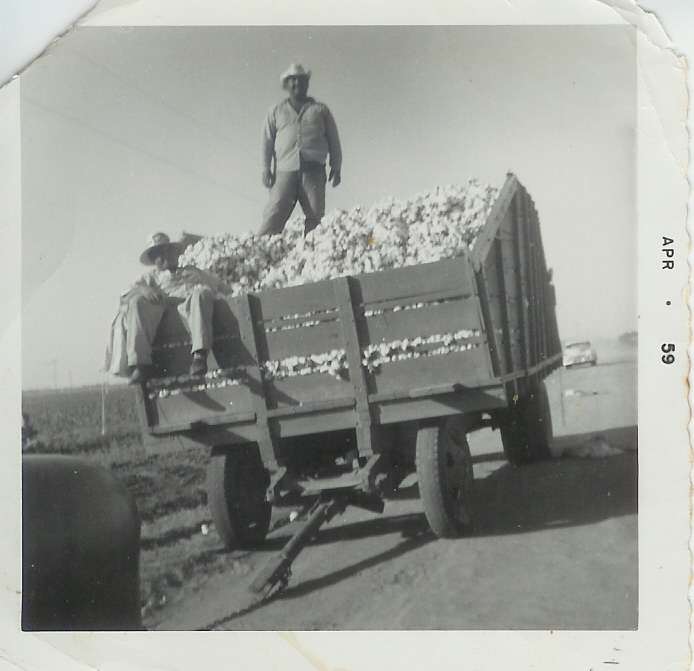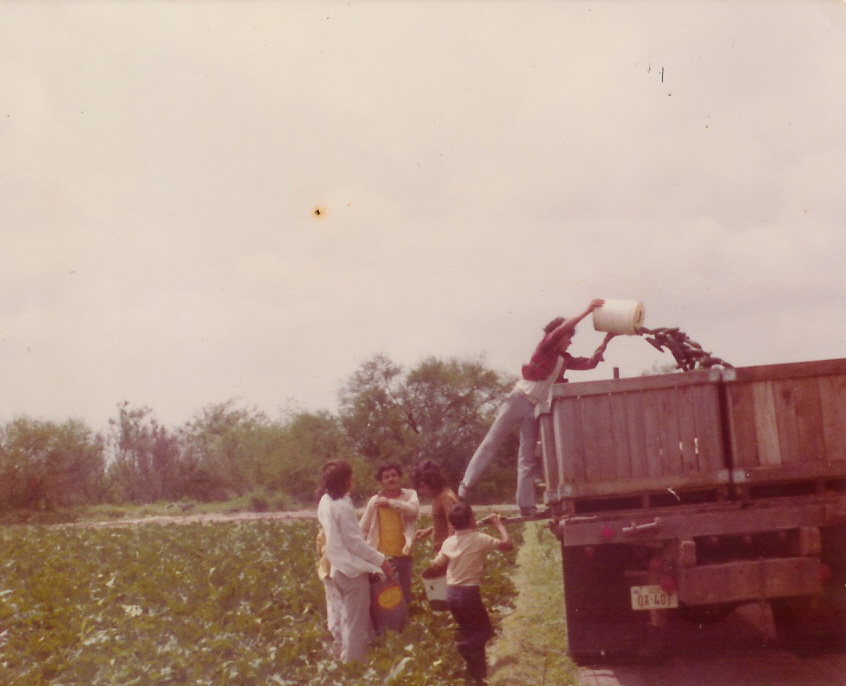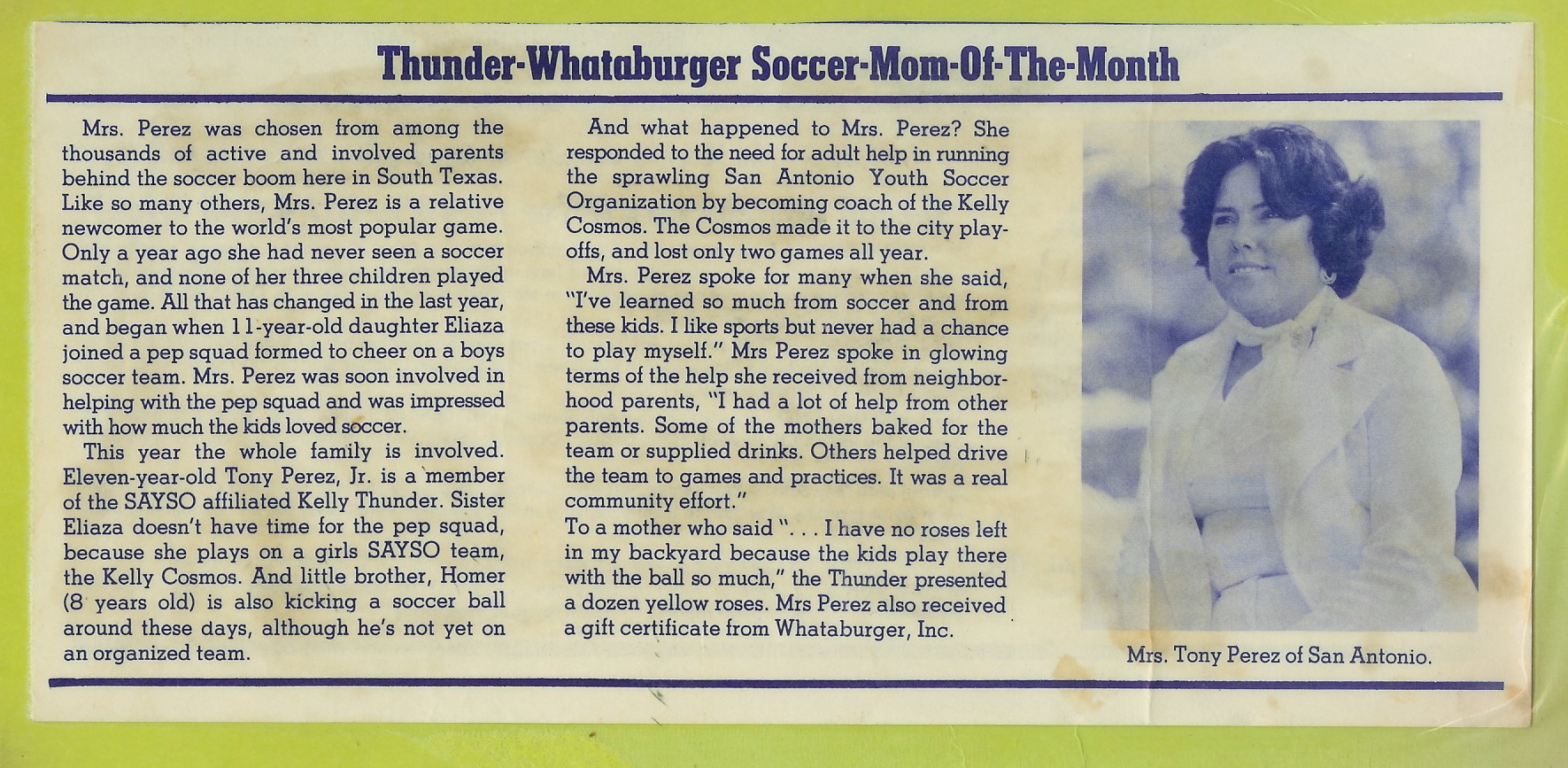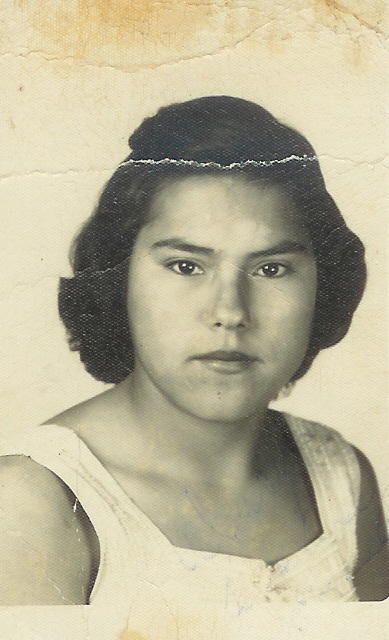TRANSCRIPTION
This interview was took place at the home of Oralia Perez.
Where and when were you born?
I was born in Edinburg, Texas on November 29th in 1942. I was the 2nd child out of my brothers and sisters. I was born in my house. A "paleta" or I guess in English it would be midwife. I was the first girl of the family.
To whom were you born to and how many brothers and sisters do you have?
My parents were Bruno Escobar and Olivia Escobar. My mother's maiden name was Lopez. When she and my father married she of course became Escobar. I have three brothers; Isidro, Bruno, and Alejandro. Isidro is my older brother and the oldest out of all of us. Then I have four sisters; Minerva, Alysia, and Lillian. I am the oldest out of the sisters.
What was school like for you?
All of us kids went to school, but I only passed to the fifth grade. My parents took us up north to work in the fields in April in the early fifties. We would go chop the cotton.

Did you understand why your parents were pulling were pulling you out of school at that time?
At that time I understood because I knew we had to work and no one was going to get left behind, back then it was pretty normal for kids to be taken out of school to go work with their family.

Where would you and your family go to work in the fields?
Well, we would go up north. Places like Chicago, Michigan, and Arkansas. We would pick blueberries in Chicago, and in Michigan we would pick tomatoes. In Texas and Arkansas we would also pick cotton.

What was your way of travel and where would you and your family stay while traveling and once you got to the fields?
We use to go everywhere in my dad's old truck, and while we were heading out to the place we needed to be, we would sleep in and in back of the truck. There was enough room for all of us. Once we got to the fields that we were going to work in the people that owned that fields would provide our shelter.
Were the living conditions descent?
The little houses that we stayed in were good. They had floors and all the basic you needs. We would bring our mattresses and little stoves with us. Sometimes we would make the food outside with a little fire. If we needed something we would go up town to the little store. We never went hungry or anything like that.
When you would your family get paid for working in the fields? If so how much was the pay?
I remember for cotton we would get paid 1.50 to 2.00 dollars a day. Not much now but back then it was enough.

When did you stop working in the fields?
I stopped working when I got married in 1963. Really even after that I would still go visit my brothers who would still pick in the fields back home. We used to go pick the squash from my brother, Isidro's field. By then I had my kids with me and everyone would pick. We had a good time.
What kind of music did you listen to at that time?
I used to like the old country songs like Loretta Lynn, Patsy Cline, Hank Williams, all the old country singers. Then I liked Tejano music. We used to love to dance. I would always dance with my father. He was a good dancer."
Is there anything else you would like to add to this interview?
I would just like to say that I am very proud of my children for getting where they are today, and I encourage you and all my granddaughters to stay in school and get your education. Take advantage of what you have now and the opportunity to get ahead in life.

ANALYSIS
I learned quite a bit about my grandmother's history but there is so much more to learn form her. I know that she worked very hard and always wanted what was best for her family. My grandmother mentioned a lot of information about picking in the fields. I had no idea how much she had traveled back then. This interview was affective because I know a lot more about her now with just the little she told me. She respects those times and you can tell that she will cherish all the memories spent with her family as long as she can because when she would tell me about the pictures she would start laughing and tell me the little story that went with it.
ANNOTATED BIBLIOGRAPHY
The Handbook of Texas Online.
Copyright © The Texas State Historical Association.
The Handbook of Texas Online is a multidisciplinary encyclopedia of Texas history, geography,
and culture sponsored by the Texas State Historical Association and the General Libraries at
University of Texas at Austin. http://www.tsha.utexas.edu/handbook/online/ Last Updated: May 16, 2005.
AIER Cost-of-Living Calculator. The calculator uses the Consumer Price Index to
do the conversions. The source for the data is the Bureau of Labor Statistics. The calculator converts the cost of items in American dollars
from 1913 to the present. Organized in 1933 as a private, independent, scientific, and educational charitable organization,
the American Institute for Economic Research plans its research to help individuals protect their personal interests and those of the Nation.
American Institute for Economic Research (AIER), P.O. Box 1000, Great Barrington, Mass 01230. http://www.aier.org/colcalc.html. (2005).
Altman, Linda Jacobs. Migrant Farm Workers: The Temporary People. New York: Franklin Watts. (1994). This was about the economic history of using migrant workers in agriculture.
Atkins, S. Beth. Voices from the Fields: Children Migrant Farm workers Tell Their Stories. Boston. Little Brown. (2000). This book contains many stories about the migrant worker's experiences and how they lived their lives in that time.
Return to Oral History Projects

